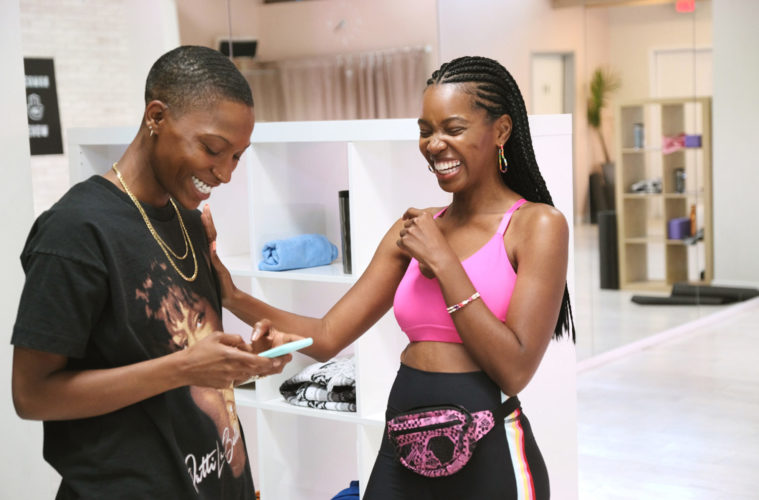Lena Waithe’s highly enjoyable BET drama Twenties might have been inspired by her experiences trying to break into Hollywood, but the show explores so much more, including the dynamics of friendships, relationships (gay and straight) and figuring out what you want in life — stuff that we all deal with in early adulthood. Jonica T. Gibbs, who got her start as an LGBTQ comedian, brings warmth and realism to her role as Hattie, the aspiring TV writer representing Waithe on the show, and watching her navigate the complexities of life in Los Angeles with her two best friends by her side makes for one of the best binges BET has to offer, no matter your race or sexual orientation. Watch it and see for yourself, then read this enlightening chat with the rising star.
L.A. WEEKLY: Your character in Twenties is loosely based on Lena Waithe’s life in her 20s and her time pursuing a career as a screenwriter. Can you tell us how you first came to connect with Waithe?
JONICA T. GIBBS: Myself and a few of my friends were producing a show called No More Comics in LA. My best friend and I were producing it and we decided to switch gears and start to crowdfund, and so we created these content boxes with gifts and stuff like that but also a USB drive so people could watch my video [that explained] like why this was a passion for us and also, you know, how they could potentially help us. We also put a trailer on there as well of what we already managed to do on our own and the quality content we were doing. So we sent those to several different people around town. The director of the series knew Lena’s assistant at the time and he was able to get this to her.
You started out doing stand-up. Was Lena aware of your comedy work before she eventually had you audition to play Hattie on Twenties?
She sent Rishi, her business partner, to see me. We did a whole campaign basically to raise money and so we did several events. I do stand-up comedy, so of course one of these was going to be a comedy show. Rishi came up to the comedy show and saw me before I was given an opportunity to audition. So I think, coupled with that and reading the script, somehow she just decided. Also we had a mutual friend in common, maybe that gave her somewhat of a green light, too. I’m not sure, but she decided to throw me a bone and she allowed me to audition.
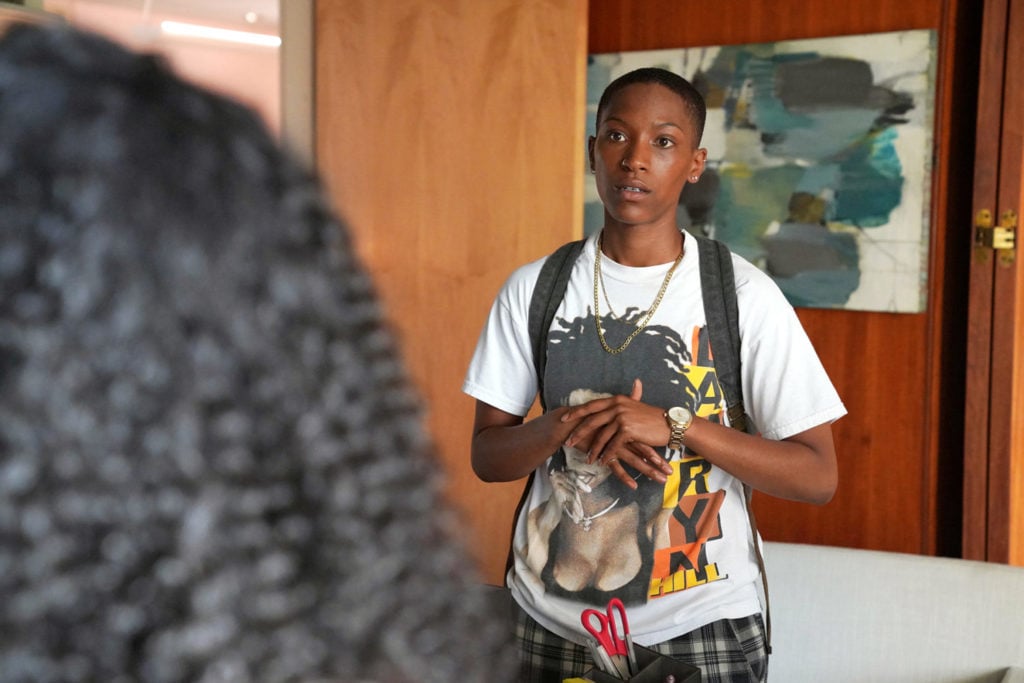
Jonica T. Gibbs on BET’s TWENTIES. (Ron P. Jaffe/BET)
And you were already familiar with her work right?
Oh yes, of course. Being a part of the LGBTQ community myself, Lena Waithe is very heavily influential in that community. And of course, I had seen her work and I have friends that work in the industry, so I heard of her and heard of her work and I had seen her episodes of Master of None and thought that she was really incredible. So yeah, I was very excited to work with her.
What have you learned from Lena?
I would say that one of the main things I’ve learned is stay ready and you don’t have to get ready. You should always be in practice or whatever skill you want to, or whatever talent you want to display or field you want to intercede. You just have to practice and stay ready. A moment like that — I could have never foreseen getting an opportunity out of the blue to audition for the lead of a show, you know? So you know, it was making sure that I’m constantly on my toes and making sure that I’m ready. When the ball is put in your hand, you’ve got to be ready to make your shot.
You’re from South Carolina originally. When you moved to L.A., what did you want to do? What was your plan?
The whole purpose in coming here and sacrificing stability and foregoing even knowing if I would even make it happen was to pursue acting. After college — I [studied] journalism. I never tried to pursue it though because I had some negative experiences in college, I guess, with the journalism department and some of the professors there. I was like, I don’t think this is for me. So it wasn’t something that I pursued after I graduated. I actually started working in higher education and then I just realized, I really want to act.
The reason I picked journalism was because to me it sounded more reasonable than saying I want to act to my parents. It sounded more logical and more steady. I grew up with my great grandparents, so we watched the news every morning and every night. So news people, the people that work in journalism were always highly respected and highly renowned. The local news lady was famous to me.
I just got turned off by it from professors who, you know, I felt like let me know quickly that I had to stay within a particular box of content creation in a particular space. So I was just like, yeah, I don’t think that’s quite for me. And so I got out of college, was trying to figure things out, and after a few jobs I was like, I don’t know if I’m going to love acting, however, it’s been something in my heart since I was a small child and I owe it to myself to try because otherwise I’ll always wonder. And so me moving to LA was me just putting all my cards in and rolling the dice and being like, well I got to try. Because otherwise I’m always going to wonder, and that’s torture to me.
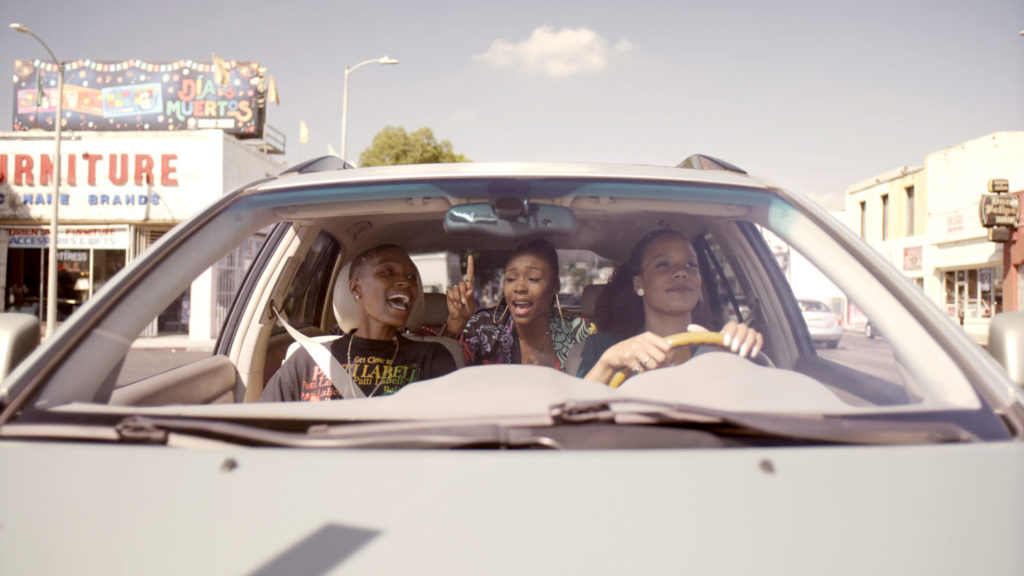
Jonica T. Gibbs, Gabrielle Graham and Christina Elmore on BET’s TWENTIES. (BET)
Twenties has been lauded for its representation of a more masculine lesbian character as the star. Was your look a conscious decision by the producers? And is this your normal style in your own life?
In reference to Hattie, the character, for sure. Lena is a stylista, number one, and she put a lot of effort. Even her casual looks are [seem] effortless, but they took effort. Like the shoes are dope, the shirt is dope, the pants, you know everything is a look. So I think that she was very particular about that. And then Derica Cole Washington, the stylist on the show — I know for a fact that she was very particular in making sure that she honored, you know, the stylization of a character like Hattie. Someone who is masculine presenting but still a woman, you know what I’m saying, and what that might entail and what she might wear. Just because it’s masculine doesn’t mean that it’ll look good on a woman. We’re shaped differently than men so I think that that was a challenge for Derica to find looks that allowed the character to show her full range of personality but also that looks good for a feminine disposition.
In terms of myself, with the quarantine the last month, I’ve been wearing sweatpants every day. I think I got five, I got like six outfits. I wash them all on Sundays, start over for the next week. It’s been back in rotation, but in my real life, you know, I’m very much a chameleon and I don’t feel like I have to adhere to societal standards of dressing like this or that. There’s a certain type of way that even being a lesbian or even being, I guess, a tomboy or whatever you may call it, there is a feeling that exudes through women once they put on heels, you know what I’m saying? Some women, me in particular, let me just speak on me, I don’t miss that. However, I also acknowledge that I can get through a party the whole night with sneakers on [better than] heels. So I would say that my personal fashion is more fluid. Lately I would say that I’ve started becoming more masculine presenting.
To be honest with you, I came out of the closet and I still wasn’t getting chose [by women]. I still had guys trying to holler at me and I said, maybe I’m giving off the wrong vibe? Then I realized, wow, actually, I look good like this, and I’m comfortable like this, too, and I like this. But I knew for a fact that I had to switch it up. Basically I shop throughout the whole store. If I’m on the women’s side and I see something I like, I’ll grab it. If I’m on the men’s side, I’ll see something I like and grab it. And I realized that through that process of self-discovery and my sexuality and trying to be like, “all right ladies, what’s up? I’m here!” I like it all. I like all the styles, I like all the representations of myself.
Why do you think it’s been important for Hattie, the lead on Twenties, to present the way she does?
Well, it’s not something that’s very common, especially I think in the black community. I think there’s kind of an uncomfortable essence — displaying blatant gayness. However, I think that that’s why it’s important, you know what I’m saying? You have to normalize the presentation of all different types of people and acknowledge and accept it. All of us know somebody who’s like a Hattie. I think Lena was definitely making a significant choice to pull that particular demographic out of the shadows and make sure that they are being represented as well.
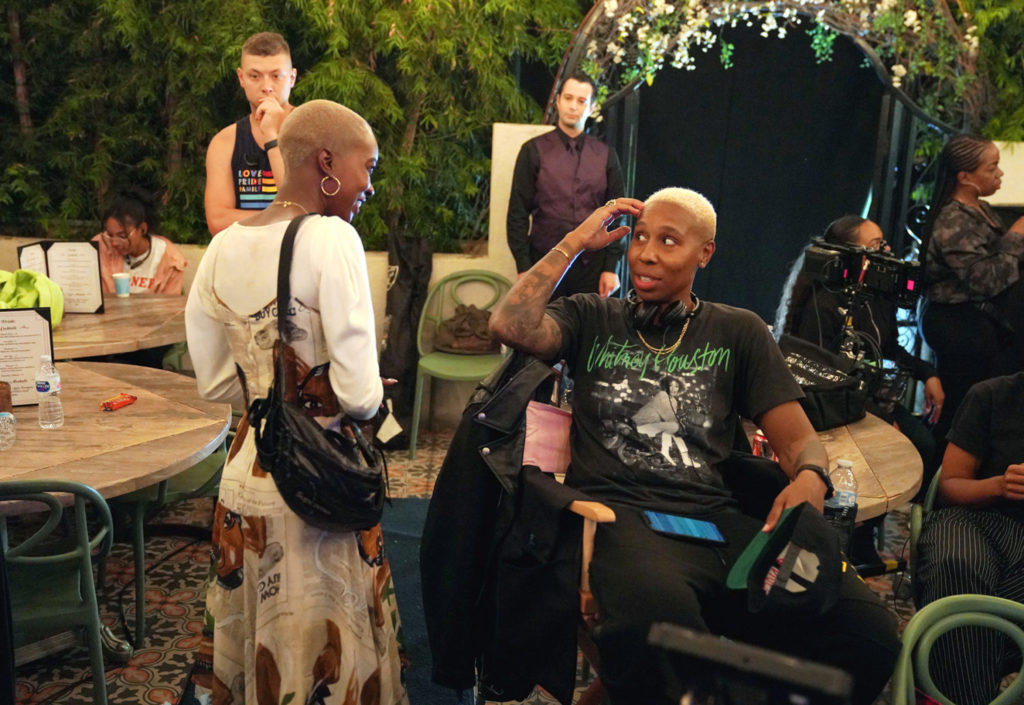
Behind the scenes of BET’s TWENTIES with Lena Waithe. (Ron P. Jaffe/BET)
Can you speak to how the show highlights the similarities between its gay and straight relationships. And the differences?
I think that the show does an incredible job of not necessarily representing Hattie as everything she is, but not necessarily highlighting one particular aspect of her. It’s not a show about gay people. It’s a show about a person who just so happens to be gay and she’s living her life and she has friends that are not, they’re living their lives, they’re going through things, and all of us can really relate. If you take the whole gender and sex part out of a person, you know out of looking at a person, which if you not having sex with somebody you shouldn’t, it’s not how you consider [someone or] how you perceive that person. So that’s what I love about the show — Hattie is a lesbian, Hattie is confidently herself, however, [anyone] can watch it and find relation to the character and the characters around her.
I think for so many years, most of the content that we’ve had to ingest has dealt with heterosexual white people, you know what I’m saying, and we still related to them somehow. We still consume their content somehow, you know. I was a kid and I had a relation to Richie Rich somehow when I was watching him on Disney Channel and my life was nothing like that. I don’t think it’s that complicated. I think that people should look at content and consume it for what it is and sexuality is something that’s so, it’s so minute in the bigger picture, and body of art in terms of television. Unless it’s the main point. If there’s something very specific and they’re trying to drive a point, then I get that. However, I don’t think that’s the case on Twenties.
People in their 20s are still discovering and learning. It seems like that is the main point of the show, showing that formative time in a person’s life.
Oh yeah, I would definitely agree with that. I think that especially towards the end of the season you start to see more of a storyline developed with all three main characters more in a fluid way and they all represent different aspects of seasons that you may experience in your 20s, you know? Whether that be Marie — she’s stable, she has her life together, she has a good job, but she’s also trying to get promoted. She also is trying to find her worthiness in the world and her career also and she’s also wondering if her partner is interested in things beyond her.
Then you have Nia who is trying to figure out love and she feels really connected to everything, and she’s connected to herself. And then you have Hattie who is all over the place and confidently lost in the world, you know what I’m saying. I think that everybody in there, even if you’re just looking forward to your 20s — everybody has either been through their 20s or is looking forward to going through their 20s. And so I think that anybody who watches the show regardless of age or gender or sexuality or race can find something in the show that resonates with them.
What about reflecting the African-American experience or point of view? Is that an important aspect?
I wouldn’t say it’s even rooted in African American challenges. I know Marie is dealing with being a woman in the workplace and her nemesis is another black man, though. I don’t know. To me, no, I don’t think that the show really focuses on race. I think it just focuses on more sort of the challenge of aspiring to attain a goal and a dream and what obstacles may come into place to divert your attention or how do you maneuver in that space once you get into that space. I know the show is on BET but it started off in a few other places first. It wasn’t written specifically for BET.
So what have you been doing since the lockdown?
I’ve been writing. We’re rewriting No More Comics in LA and also reading books. I just reread the first Harry Potter book which was a lot of fun. That’s something I’ve been wanting to do for a while because I think as an adult I’ve been caught up in, like, if I read something, it needs to be educational and not necessarily just good for my imagination. However, you know I was like, Harry Potter is the one book I know I’m going to love. So I reread that. I’ve been working out more and just trying to build habits that I want to transfer into the new normal when we transition back to real life. That’s about it. Reading, writing and watching a lot of shows too.
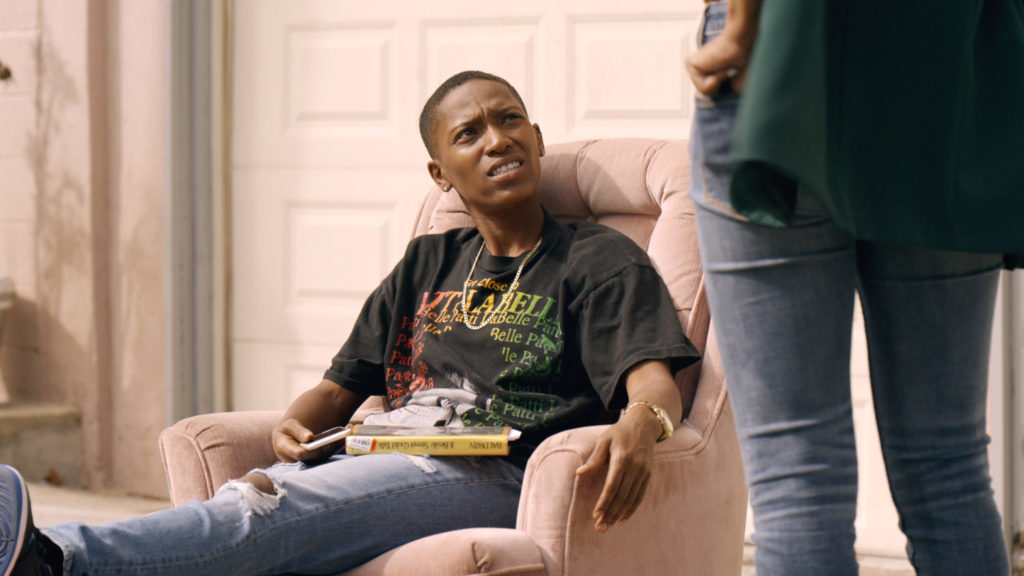
Still of Jonica “Jojo” T. Gibbs as Hattie from BET’s “Twenties” episode 101. (Photo: BET)
L.A. Weekly is conducting these special Q&As with game-changers like yourself in celebration of Pride month. Have you participated in Pride-related events?
Yes, I went to Pride in Long Beach my first year in L.A. That was an incredible experience. I had a great time. My friends and I danced the whole night! It was great, it was fun. And then I went to Pride in L.A. as well and by then I was with my partner, Olivia, and we had a great time together too. It was weird because it was two different experiences. The first Pride I was out there, just hoping I would meet a woman. Just out in the crowd, thinking like if I can’t meet nobody here, I don’t know where I have to meet them! This is the Mecca for lesbians right now. This has got to be it, and I didn’t meet anybody… then to go with my partner the next time- that was an incredible experience and definitely a lot less stressful because you can really enjoy the moment rather than trying to catch somebody’s eye.
I think that it’s extremely important because they give space and room for people to feel comfortable who as part of the community. LA is a very liberal area, however places like where I’m from, South Carolina or other places in the South, you know, who knows. You may not be able to 100 percent feel confident and comfortable in presenting your full self. I feel like Pride is one of those events and spaces that I appreciate because it gave me a space to really just feel comfortable and be like, ‘OK, we all on this out there. We all on the same page.’ That’s cool. And then there are a lot of people out there who are allies and aren’t gay and that’s cool too. You see that you’re not in it alone and people are cool with it.
Read our guide to the best LGBTQ TV (including Twenties) for Pride month here.
Advertising disclosure: We may receive compensation for some of the links in our stories. Thank you for supporting LA Weekly and our advertisers.

